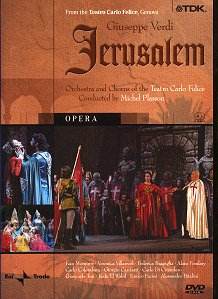Verdiís Jerusalem is not merely a version
of I Lombardi. It is so different to its progenitor that
Verdi wished to have an Italian translation of this French work
introduced to La Scala as a new piece. The full story is clearly
explained in Alexandra Maria Dielitzís excellent notes to this
DVD. This production was filmed at the Teatro Carlo Felice in
Genoa. It is sung in French and, appropriately, conducted by a
Frenchman, Michel Plasson. Most of the singers are Italian, presumably
members of the Carlo Felice theatre company.
Let us clear away the technical issues of both
video and production that might influence purchase. Despite the
video aspect being 4:3 the picture is in effect wide-screen with
the subtitles superimposed on the black bar beneath the picture.
The picture is clean and good to look at, as is the production.
But on my system the DTS and Dolby Digital tracks were muffled
and so far out of synchronisation with the picture as to make
it unwatchable. Switching to plain vanilla PCM Stereo solved that
and the sound was perfectly acceptable, in fact quite good. Purchasers
looking for the surround experience should avoid this DVD. The
English titles are poorly proof read with many errors in the sung
libretto - "gender" for "tender" at one point
for example. The translation itself is not consistent either,
there being parts where it stops altogether. Those whose French
is up to following the libretto sans subtitles will have to contend
with the very foreign sounding French of the Russian lead Ivan
Momirov who sings Gaston. He even looks strange singing
in French! As if that were not enough, the chorus are an ill disciplined
lot who manage to look either wooden, or distracted by things
elsewhere on stage. On many occasions they can be seen looking
in quite the wrong direction.
On to the opera performance itself! The whole
piece looks very good, the scenery is conventionally realistic
but up to a high standard; no wild, philosophical, directorial
ideas here thank goodness. The costumes are similarly normal and
suitably sumptuous. The stage director has overlooked some aspects
of the visual experience. For example in Act 2 when Roger sings
of his whitened hair it is quite obviously still black as it was
in Act 1 before he suffered a trauma. He is in fact almost entirely
unchanged throughout, save for the costume, which makes the endless
number of meetings with people who fail to recognise him a bit
hard to accept, even in opera! The work itself is slow to start
and it was only in Act 2 that I began to take an interest. Hélèneís
big aria (DVD 1 Track 19) is livelier than anything in Act 1.
The chorus sings the subsequent number (DVD 1 Track 20) well and
are treated by the audience to prolonged booing for their pains.
I could not quite understand why. Perhaps the editorís scissors
removed some dreadful fluffs before the performance reached DVD.
The final duet of Act 2 is a very good piece of Verdi with contrasting
cries of "to arms" against the surging rhythms of the
lovers oath of fidelity.
Act 3 takes place in a harem and is Verdiís excuse
for a ballet to satisfy the Parisian audience. The scene as the
curtain rises draws a spontaneous outburst of applause from the
Genovese audience, it is indeed very beautiful with coloured drapes
and highly appealing costumes. Scene 2 of this act is more "big"
static singing which comes as a bit of a let down after the dancing
of Scene 1. Act 4 showed just why Jerusalem is not vintage
Verdi. It is full of ranting clerics going on endlessly about
the mercy of their obviously savage God. It reinforces the absence
of truly sympathetic characterisation. Most of the characters
are cyphers and they do not engage oneís sympathies. Even in the
set piece dramatic confrontations with which the piece abounds,
one just doesnít care what happens to any of them.
So, do you buy this DVD? You get about 2Ĺ hours
of Verdi spread over two discs, much of which you probably do
not know. It looks very good, it sounds good (in stereo), and
the singers are generally more than capable of performing the
piece. Michel Plasson drives it along at a lively pace and the
orchestra plays well. Yes, you buy it because there is unlikely
to be another Jerusalem along any time soon and it is,
when all is said and done, by Verdi.
Dave Billinge
